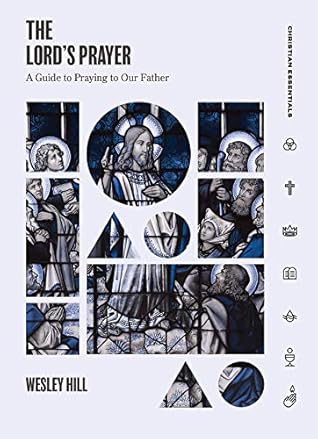More on this book
Kindle Notes & Highlights
by
Wesley Hill
Read between
May 21 - May 22, 2020
when Christian liturgies introduce the Lord’s Prayer in the context of worship, they often use a formula like this: “And now as our savior Christ has taught us, we are bold to say …” We can, in other words, give up all our anxious efforts to pacify, convince, or haggle with God.
God is already and always attentive to His children. It is with that in mind that Jesus says to His disciples, “Pray then in this way …” (Matt 6:9).
There are nearly half a million words in the Hebrew Bible, yet God is only portrayed as a father some fifteen times.11
The Son’s being begotten from His Father is, as the creed insists, eternal. Before and beyond all worlds (our time-bound language reaches its limits here), God is born from God but in such a way that there is only one God.
Those first words of the prayer are even more remarkable because with them, we are invited to address God in the same way that Jesus does. God is Father eternally, and Israel, too, in its memory of God’s saving acts on its behalf, had known God by that name. But Jesus’ words—His use of the plural possessive pronoun “our” is the key—beckon us to take our place alongside Him, looking up to Him as our older brother (Heb 2:10–18),
Feminist theologians have pointed out that we can easily toggle between thinking that God is beyond gender, but we call Him “Father” because that is what the Bible authorizes, and thinking that we call God “Father” because God is male. The former is what Christianity has always taught, but the latter is what many Christians seem to hear. And that, feminist thinkers rightly warn us, is dangerous.
Any picture of God as “Father” that leads us to think in terms of domination and cruelty rather than of humble service and unending love is not a true understanding of the God and Father of our Lord Jesus Christ, “who loved [us] and gave himself for [us]” (Gal 2:20).
the God of the Bible is beyond our categories of comprehension.
According to Pope Benedict XVI, it is, paradoxically, “a name and a non-name at one and the same time.”20 In some mysterious way, God seems to be saying to Moses, “You may call Me by name, but do not make the mistake of thinking that you thereby comprehend Me. I am free to be Who I will be. My name means … I exist.”
We may think, for instance, of a Christian like Polycarp, one of the earliest Christian martyrs. In the second century, faced with the demand that he hallow the emperor of Rome as “Lord” and “Savior,” Polycarp refused and said, “For eighty-six years I have been serving [Jesus Christ], and he has done me no wrong. Indeed how can I blaspheme my king who saved me?”24 Closer to home, we may think of a Christian like Kevin Harris formerly of the Marin Foundation, who, when he was living in Chicago’s Boystown neighborhood, grew concerned about the damage done when his fellow Christians led many
...more
In Christian theology, God is never understood as the origin of evil. James rules that out in no uncertain terms: “No one, when tempted, should say, ‘I am being tempted by God’; for God cannot be tempted by evil and he himself tempts no one” (1:13). Human beings often project our own cruel or foolish inclinations onto God, imagining that God, like us, sometimes lures others into sin just for the fun or meanness of it. But the God we see in Jesus Christ isn’t like that.
Whatever else the petition “Lead us not into temptation” means, it cannot mean that God will spare us the searing heat of the refiner’s fire.
We pray, “Save us from the time of trial” or “Lead us not into temptation,” depending on the translation. Reading these words in the context of the entire gospel, we can see immediately that God intends to answer—has already answered—this prayer. We will be saved from the time of ultimate trial, sheltered from it and spared from ever experiencing its true horrors, because there is One who already has experienced those horrors in our place. Because Jesus was not saved from temptation, we are.
Evil is not just what we do, but—more hauntingly—it is what we suffer, what we are mired in and encrusted with.
The prince of racism—and of so many other forms of evil—hinders even the most virtuous white people from ending their own racist habits of mind by sheer decision. Stronger medicine is needed. And that is what Jesus urges us to pray for: we must, in the end, appeal to God to deliver us from the grip of the Evil One. Christians who worship whiteness don’t just need education; we need exorcism.
Somehow, by dying, Jesus has rendered the devil impotent, denuding him of his ability to win the war he wages against human beings.
For so long in Western theologies, we have focused most of our attention on all that we believe Christ provides for us—a clean conscience, say, or a restored marriage, a renewed work ethic, a reconciled community, the promise of justice and healing for the creation, and so on—that we have tended to forget the aim of all Christ’s benefits: that we ultimately would be, as the hymn puts it, “lost in wonder, love, and praise.”63 Yes, pearly gates and golden streets will be lovely, but the point of all this heavenly imagery is to help us see that God Himself will be the Christian’s eternal
...more
All of Jesus’ life was oriented toward one goal: bringing human beings into a restored relationship with God so that they can behold God’s glory forever, bathed in His radiant light and reflecting His worthiness back to Him in praise and adoration.


